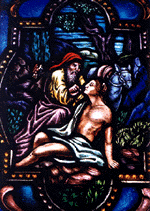|
|
|
GETTING
STARTED |
| |
WEEK 1
UNIT 1 |
Introduction
What is Love? What are the different kinds of love?
In what ways are love and friendship philosophically significant topics?
(after class you may wish to review Lewis, Chapter
I, "Introduction," and Chapter II, "Likings and Loves") |

Auguste Rodin, "The Kiss"
|
|
EROS
(See Lewis, Chapter V, "Eros") |
WEEK 1
UNIT 2 |
Plato, Symposium 172a-199c (Nehamas/Woodruff
pp. 1-39)
What themes are repeated in the different speeches
offered in favor of Love? What significant agreements and disagreements
do you see between the various speeches? What ethical and metaphysical
significance does Love have for the speakers? |
WEEK 2
UNIT 1 |
Plato, Symposium 199c-223d (Nehamas/Woodruff
pp. 40-77)
What sort of thing does Socrates think Love is?
Why? Is Love Beautiful, according to his (and Diotima's) view?
What is the true object of Love's desire? What is the point of Alcibiades'
drunken speech at the end of the dialogue? |
WEEK 2
UNIT 2 |
Freud, Civilization and Its Discontents,
Parts III-V (reserve in Foley Center)
Introductory Notes on Freud's
Psychology of Eros
Free
reading on erotic love |

Pierre-Auguste Renior,
"The Boating Party" (detail)
|
|
FRIENDSHIP
(See Lewis, Chapter IV, "Friendship")
Introductory Notes
on Friendship |
WEEK 3
UNIT 1 |
Plato, Lysis (OS pp. 3-27)
What do you think is the philosophical purpose of
the introductory sequence of the dialogue (in which Socrates speaks with
Ctesippus and Hippothales)? How does that conversation shape our
perspective on the discussion that takes place in the wrestling school
between Socrates, Lysis, and Menexenus? What, if anything, do they
learn about friendship? What is this dialogue really about?
Notes on Plato's Lysis |
WEEK 3
UNIT 2 |
Aristotle, Nicomachean Ethics excerpts
(OS pp. 30-69)
How successful is Aristotle in offering a definition
of friendship? What does Aristotle seem to think is important about
friendship? What motivates it? Are all friendships equal?
Why or why not? How well does Aristotle's analysis work for friendship
today? |
WEEK 4
UNIT 1 |
Cicero, "On Friendship" (OS pp. 79-116)
According to Laelius, what are the key features
of friendship? In what ways does his view of friendship parallel
with or contrast to Aristotle's?
Introduction to Cicero's
"On Friendship"
Kant, "Lecture on Friendship" (OS pp. 210-17)
What, in Kant's view, is the moral status of friendship?
Does friendship deserve moral praise? Why or why not? |
WEEK 4
UNIT 2 |
Free
reading on friendship
AT LEAST ONE ESSAY MUST
BE SUBMITTED BY THIS DATE. |

stained-glass image of the Good Samaritan
|
|
CHARITY
(See Lewis, Chapter VI, "Charity") |
WEEK 5
UNIT 1 |
Selected "Life Stories of the Buddha" (on reserve
in Foley Center)
What do these stories tell us about the Buddhist
view of life? What responsibilities to people (particularly powerful,
wise, or enlightened people) have to others? Are there limits to
the sort of sacrifice that are regarded as morally good? What is
the motivation for sacrifice?
Christian views of love from the Bible (on reserve
in Foley Center)
read the following passages
from the Bible (any modern translation is acceptable, or click on the links
for online versions):
Matthew
5:43-48--love for enemies
Luke
10:25-37--the Good Samaritan
Matthew
22:34-40; John
13:34-35; John
15:1-15--love as commandment
Romans
15:1-4; 1
Corinthians 12:31-13:13--Paul on love
Aquinas, Summa Theologiae excerpt (OS pp.
171-84)
Thomas' objective is to synthesize the Aristotelian
conception of friendship and Christian theological claims about our relationship
with God and with other human beings. How well do you think Aristotle's
ideas apply to Christian ideas?
Thomas Aquinas on Charity:
Background and Reading notes |
WEEK 5
UNIT 2 |
Kierkegaard, excerpts from Works of Love
(OS pp. 235-47)
Kierkegaard objects to the particularism of friendship,
and argues that Christian love is radically different in its aims.
Why?
Soren Kierkegaard
on Christian Love
Barbara Andolsen, "Feminism and Agape" (on reserve
in Foley Center)
Andolsen argues that the selflessness normally associated
with Agape is a male-fostered compensation for the selfishness of men.
What does she propose as an alternative? Does it do justice to the
idea of Agape?
OPTIONAL:
Stephen Post, "A Theory of Agape" (on reserve
in Foley Center)
What according to Post is the key to the notion
of Agape love? |
WEEK 6
UNIT 1 |
Nel Noddings, "On Caring" (on reserve in Foley
Center)
Richard Dawkins, excerpt from The Selfish Gene
(on reserve in Foley Center) |
WEEK 6
UNIT 2 |
Free
reading on charity/unselfish love
Course Conclusion |



